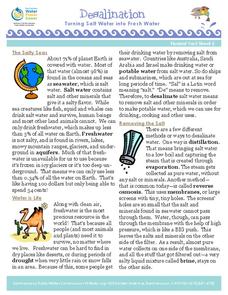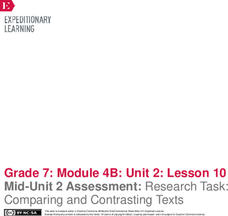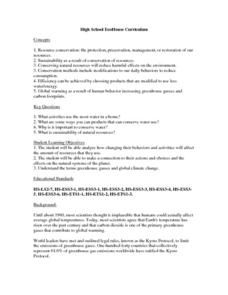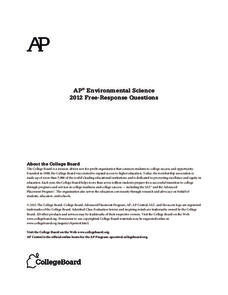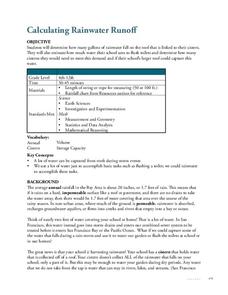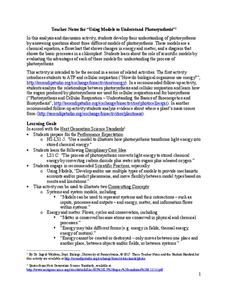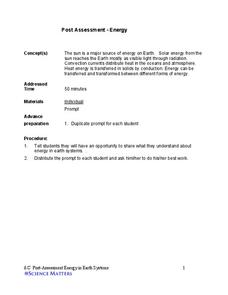Columbus City Schools
ABC: Acid Base Chemistry
Bubble, bubble, boil and trouble! What causes common substances like baking soda and vinegar to react the way they do? Welcome your junior chemists to the wonders of acid-base chemistry using a comprehensive and fun resource. Engage them...
San Francisco Public Utilities Commission
Desalination: Turning Salt Water into Fresh Water
How does San Francisco supply its citizens with enough water, even during a drought? Learn about reservoirs and why desalination could be a good solution with a reading passage about water conservation. After kids finish the...
EngageNY
Using Effective Search Terms: Researching Water Management
Discover how to use search terms effectively! Scholars continue their exploration of Charles Fishman's The Big Thirst, engaging in a read aloud and then answering text-based questions. Next, pupils learn about using search terms and...
K12 Reader
Taking Care of Earth
Provide a brief introduction to ecology and conservation with a reading passage. Learners can read the text, answer the five related questions that are included on the page, and discuss the reading.
EngageNY
Mid-Unit 2 Assessment: Research Task: Comparing and Contrasting Texts
It's the half-way mark! Pupils demonstrate understanding of unit standards by completing a mid-unit assessment. After reading an informational article about water management strategies, scholars complete a graphic organizer to identify...
EngageNY
Forming a Research-Based Claim: Cascading Consequences Charts
Life is all about choices and consequences. Using a Cascading Consequences chart, scholars create a visual map of the effects of a particular choice or action related to water management. With their researcher's notebooks and copies of...
EngageNY
Using Multimedia in Presentations: Presenting Claims
Visuals help clarify claims. Scholars create visual displays to accompany their end-of-unit presentations about water sustainability. Using blank paper and their notes from the unit, they put their creativity to good use and then...
Curated OER
High School EcoHouse Curriculum
How has the level of carbon dioxide changed over recent years, and what is contributing it? Groups work together to research and present their findings in a creative way. Also built into the lesson is a visit to a sustainable house, but...
Serendip
How Do Biological Organisms Use Energy?
When an organism eats, how does food become energy? Young biologists follow glucose through the process of cellular respiration to the creation of ADP using a discussion-based activity. The resource also highlights conservation of mass...
Beyond Benign
Ecological Footprint
How does your lifestyle measure up in terms of your ecological footprint? Young ecologists examine their impact on the planet using an insightful online calculator. A short quiz asks users to rank the size of their homes, their energy...
College Board
2012 AP® Environmental Science Free-Response Questions
Sometimes solving one problem leads to another. Scholars respond to questions about fracking to harvest natural gas and other environmental related topics. The resource provides items released from the 2012 AP® Environmental Science exam...
PBS
Blow the Roof Off!
Blow the minds of young scientists with this collection of inquiry-based investigations. Based on a series of eight videos, these "hands-on, minds-on" science lessons engage young learners in exploring a wide range of topics from making...
Concord Consortium
Chain Reaction Between Hydrogen and Oxygen
Looking for a simple way to teach conservation of energy in chemical reactions? Pupils can observe energy changes as water forms during a chain reaction between oxygen and hydrogen using an interactive. The resource instructs users to...
College Board
2004 AP® Environmental Science Free-Response Questions
Radioactive isotopes have a wealth of uses, but their waste may cause some concern. One of four free-response questions challenges learners to devise a waste removal strategy for medical radioactive substances. Other questions address...
Environmental Protection Agency (EPA)
Matching Fun Facts Game
A fun and quick way to either assess understanding at the end of a water conservation unit or to introduce the topic, learners play a quick matching game online. In the matching game, users must type the letter that corresponds with the...
Project WET Foundation
Explore Watersheds
What makes a watershed? What are the natural and human features of a watershed? How do human features affect watersheds? Where can I find my local watershed? These questions are thoroughly explained in an informative watershed interactive.
Techbridge Curriculum
Calculating Rainwater Runoff
Thirsty plants soak up every bit of a rainfall, but what happens to the rain that hits the roof? Calculate the amount of rainwater from your school's roof with an Earth science activity, which brings measurement skills, observation...
NOAA
Sustaining Our Ocean Resources
Lead young scientists on an investigation of fishery practices with the final installment of this four-part unit. Using a PowerPoint presentation and hands-on simulation, this lesson engages children in learning how fish populations are...
Earth Day Network
Staying Green While Being Clean
Clean up the environment with a lesson that focuses on replacing hazardous cleaning supplies with green, environmentally-friendly products. Using a dirty patch of surface as a control area, kids clean other parts of various surfaces...
Texas Commission on Environmental Quality
Environmental Sciences
Whether you are teaching environmental science in junior high or studying recycling in kindergarten, there is something for all in this set of lessons designed for environmental education. The 110-page packet comes with tips for teaching...
Serendip
Using Models to Understand Photosynthesis
Is your class in the dark about photosynthesis? Shed some sunlight on an important biological process with a thoughtful activity. After answering questions to help determine their level of knowledge, learners work with chemical equations...
Science Matters
Post-Assessment Energy
After nine lessons and activities about energy, here is the final assessment. The 20-questions include multiple choice, multiple choice with justification, short answer, answer analysis, and labeling diagrams to challenge learners.
Mr. E. Science
Chemical Reactions
Once I told a chemistry joke, but there was no reaction. Get young chemists involved in changes and reactions with a presentation that begins with physical and chemical changes and chemical reactions. It moves on to chemical equations...
Consumers Energy
The Cost of Electricity
How much is your toaster costing you every day? Young environmentalists calculate the monetary costs of household appliances based on their average consumption of wattage.
Other popular searches
- Water Conservation Activity
- Soil and Water Conservation
- Water Conservation Grade 5 6
- Water Conservation Florida
- Water Conservation Brochure
- Water Conservation Essays
- Water Conservation Programs
- Drought, Water Conservation
- Water Conservation Graphing
- Conservation of Mass Water
- Conservation of Water
- Drought Water Conservation



